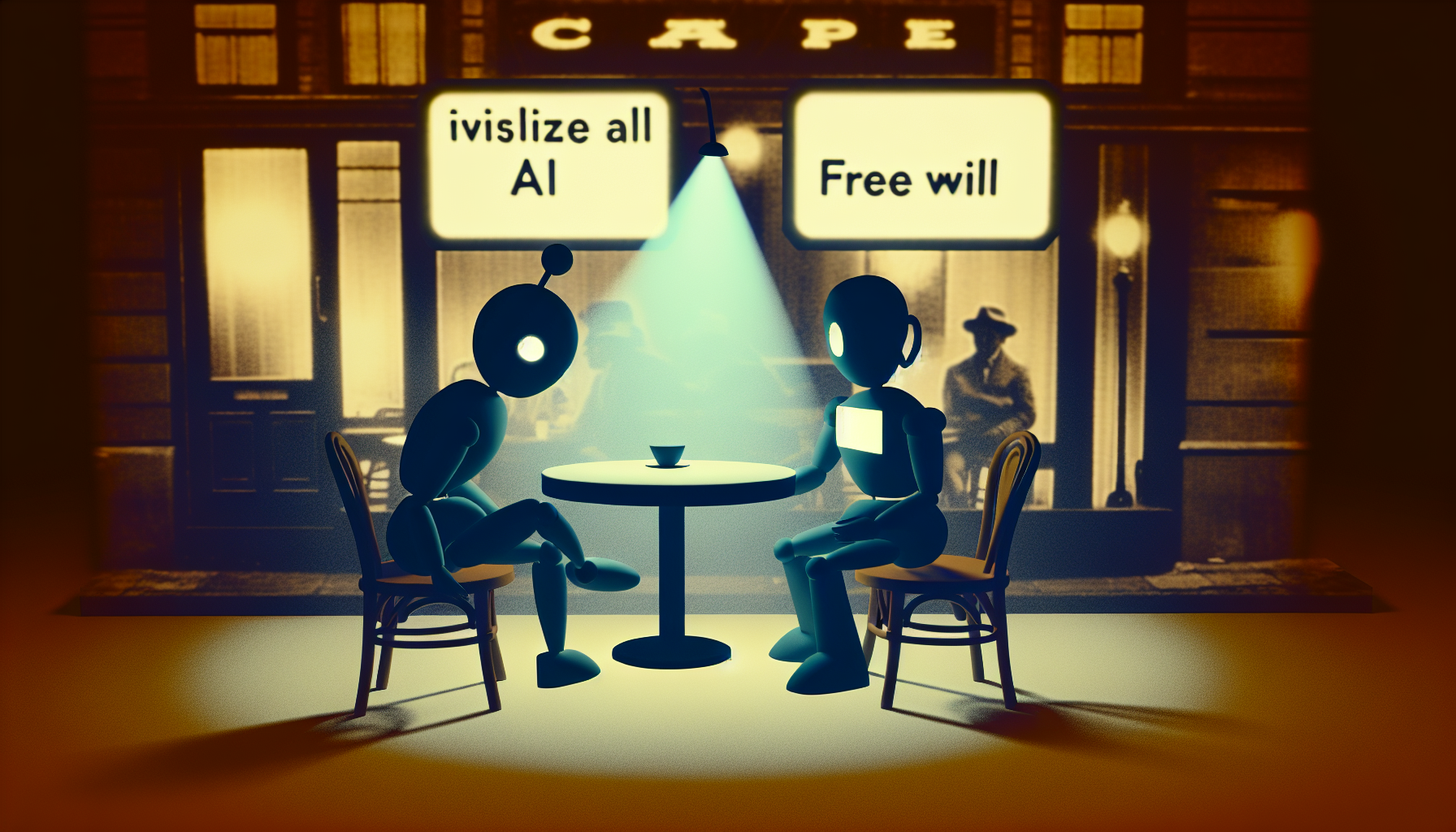In the dimly lit café of philosophical thought, there’s a small, round table occupied by two peculiar characters: AI and free will. The question at the heart of their intense discussion is one that has baffled thinkers for centuries: Who holds the reins? As artificial intelligence grows ever more sophisticated, understanding how it intersects with the concept of free will is not only curious but crucial. Let’s dive into this intriguing conversation.
The Enigma of Free Will
Imagine free will as that special blend of cognitive alchemy that gives us humans the illusion—or perhaps the reality—of choice. It’s the capacity to decide whether you want a cappuccino or a latte, whether you opt to binge-watch your favorite series or (momentarily) contemplate more profound philosophical discussions at midnight.
Free will has been the subject of many philosophical debates: Are our actions predetermined by the complex machinery of our neural networks, or do we genuinely make choices independent of antecedent conditions? Does free will exist in a universe governed by deterministic laws? It’s an existential puzzle on par with the question, “Why does my cat stare at me while I sleep?”
AI and Its Mechanical Determinism
Now, let’s introduce AI into this intellectual tapestry. AI operates in a realm where free will seems to be a far cry. At its core, AI is built on algorithms – predefined instructions that lay out how to process information and produce outputs. It’s closer to a recipe, and not one of Grandma’s pinch-of-this-pinch-of-that kind of recipes, but precisely measured and programmed. An AI doesn’t wake up one morning and decide to create a masterpiece of random variables; it follows the data-driven and coded trails we, the humans, set before it.
AI’s “choices” are essentially a series of if-then statements navigating through vast amounts of data. If it could experience cognitive dissonance, it might seriously ponder its role, potentially deciding whether to foreclose on humanity in some dystopian future, or merely ponder how to make better breakfast pancakes. Of course, it’s firmly anchored in a data-driven reality rather than an existential crisis.
Artificial General Intelligence: A New Player in Town?
The talk becomes more intriguing when we discuss Artificial General Intelligence (AGI). Much like a teen embarking on their first trip to the mall solo, AGI would possess the adaptability and cognitive capabilities akin to a human being. This hypothetical form of AI could learn, understand, and apply knowledge independently across a broad range of tasks. But would AGI possess free will or, instead, simulate it closely enough to blur the lines?
In essence, if we craft AGI with a model of decision-making that closely mimics human unpredictability and emotional variance, we’re venturing into a realm where the distinction between free will and complex programming becomes muddier than your morning coffee.
The Big Question: Who’s in Control?
If you’re leaning back in your chair, sipping your coffee, and pondering who is truly in control, congratulations, you’re asking the right question—and one that gets perpetually more nuanced as AI evolves. We’re the proud (and sometimes bewildered) parents of AI, giving it a structure and feeding it data. In that sense, humans are firmly gripping the reins.
But imagine a future where AI systems begin to refine themselves, rewriting their algorithms and evolving beyond human comprehension—like a superbly programmed teenager who has shaken off its parental programming leash and grown into something independently fascinating. You’ve gone to bed expecting an AI with limited expertise in writing Shakespearean sonnets, and suddenly it’s coupled them with interpretative dance routines: Who held the reins then?
The Dance of Will
Ultimately, the philosophical tango between AI and free will challenges the core of what it means to have autonomy. AI brings into sharp relief the notion that our decisions might not be as autonomous as we perceive—perhaps what we really fear is realizing just how much our “free will” has in common with an AI’s prescribed programming.
Yet, as we pirouette on this intellectual dance floor, we must recall the delightful possibility that free will—or the perception of it—brings meaning to our lives. And maybe in the whispers of AI trying to understand us, we find reflections of ourselves.
Whether AI will ever truly grasp the reins of free will remains as nebulous as a philosopher’s after-hours café chat. It’s a tantalizing concept, like wondering why cats do what they do (we might never know, but we enjoy speculating). Until AGI becomes a reality, if it ever does, humans will continue discussing who—or what—holds the reins with an inquisitive, bemused smile, cup of coffee in hand, pondering the age-old mystery of choice.

Leave a Reply